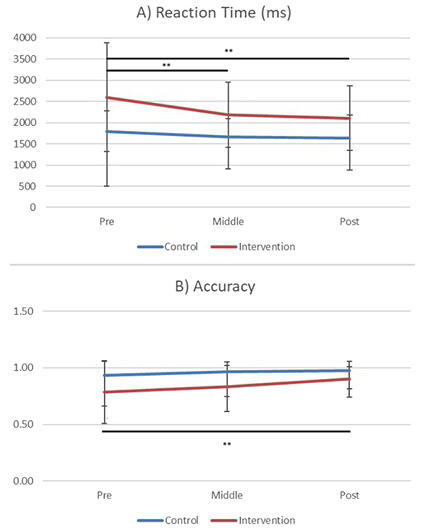The research group of Professor Masato Kawabata of the College of Sport and Wellness at Rikkyo University, in collaboration with Nanyang Technological University (Singapore), has announced that they conducted an intervention trial of online/in-person hybrid Square Stepping Exercise (SSE) in older adults in Singapore and found significant improvements in cognitive, physical, psychological, and group functioning in older adults who completed the hybrid SSE intervention. Hybrid SSE is expected to effectively improve the physical and mental health of older adults living in remote areas and homebound people. The results were published in the international journal BMC Geriatrics on April 25.

Note. ms = milliseconds. Error bar: SD. ** p <.01.
Provided by Rikkyo University
The global population of people aged 60 and above is projected to reach 2.1 billion by 2050, emphasizing the importance of preserving the physical and mental well-being of older adults. SSE consists of serial movements in forward, backward, lateral, and oblique directions on a mat that measures 100 cm in width × 250 cm in depth and is partitioned into squares of 25 cm on each side. SSE has been confirmed to effectively reduce fall risks in older adults and is expected to help maintain and improve cognitive function. Considering the coronavirus disease 2019 (COVID-19) pandemic, the research group has previously studied the feasibility of online SSE. They developed protocols for implementing online SSE and reported its short-term efficacy in experiments on sedentary young adults and older adults. Conventionally, SSE was conducted in-person with a group of multiple participants.
In this study, they examined the long-term effects of an online/in-person hybrid SSE program in sedentary older adults. A total of 93 healthy, sedentary older adults without physical injuries or medical illness participated in the experiment. Fifty-eight participants in the intervention group had never participated in SSE before and completed the 12-week hybrid SSE program. In a hybrid SSE session, a group of 2−3 participants performed SSE face-to-face with instructor guidance online via Zoom. Thirty-five participants in the control group were instructed to maintain their usual level of physical activity during the study period without starting any new activities.
The results showed that hybrid SSE was highly effective in improving executive function and physical and psychological functioning. Furthermore, participants reported increased engagement in the training task, social communication, and bonding and closeness with their group members. Cognitive function was assessed with the Stroop Color-Word Test (SCWT) and TMT, and psychological and group functioning was assessed using the Subjective Vitality Scale and the Physical Activity Group Environment Questionnaire.
Kawabata said, "The difficulty of maintaining people's mental and physical health became a global problem as people's connections and behaviors were extremely restricted due to the COVID-19 pandemic. Hoping to solve this problem, even if slightly, I developed online SSE as a safe and effective home-based exercise with the students and researchers I supervise at Nanyang Technological University. We first tested its effectiveness in young adults and then conducted two preliminary experiments in older adults before conducting the present study, described in the article published in BMC Geriatrics."
Journal Information
Publication: BMC Geriatrics
Title: Effects of Square Stepping Exercise on cognitive, physical, psychological, and group functioning in sedentary older adults: A center-based hybrid trial
DOI: 10.1186/s12877-024-04904-7
This article has been translated by JST with permission from The Science News Ltd. (https://sci-news.co.jp/). Unauthorized reproduction of the article and photographs is prohibited.




